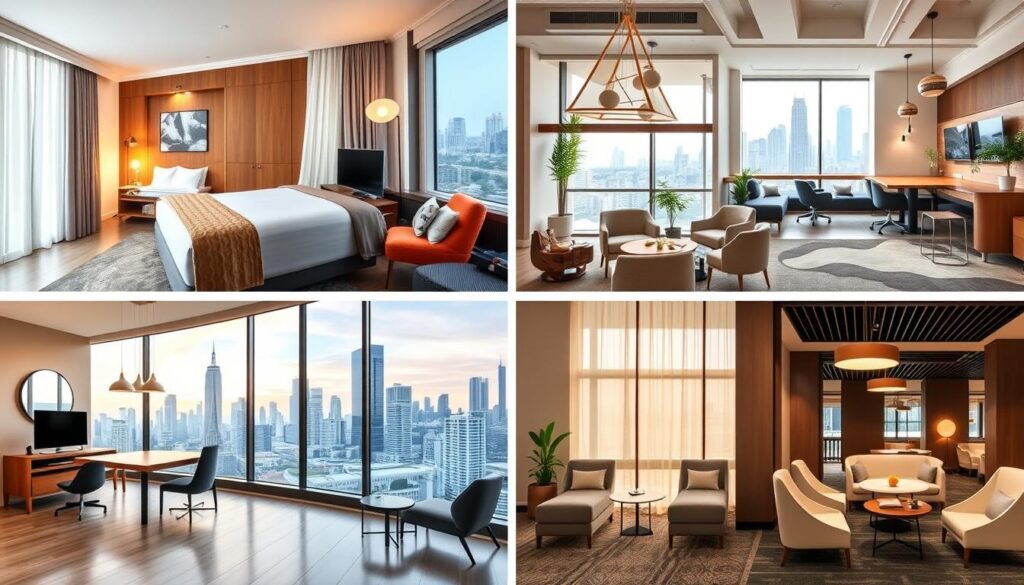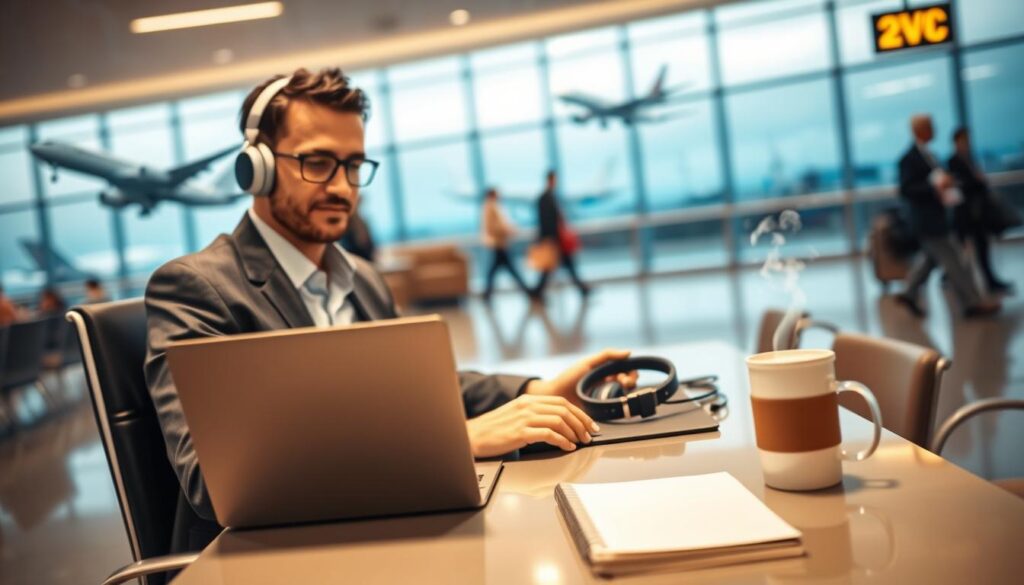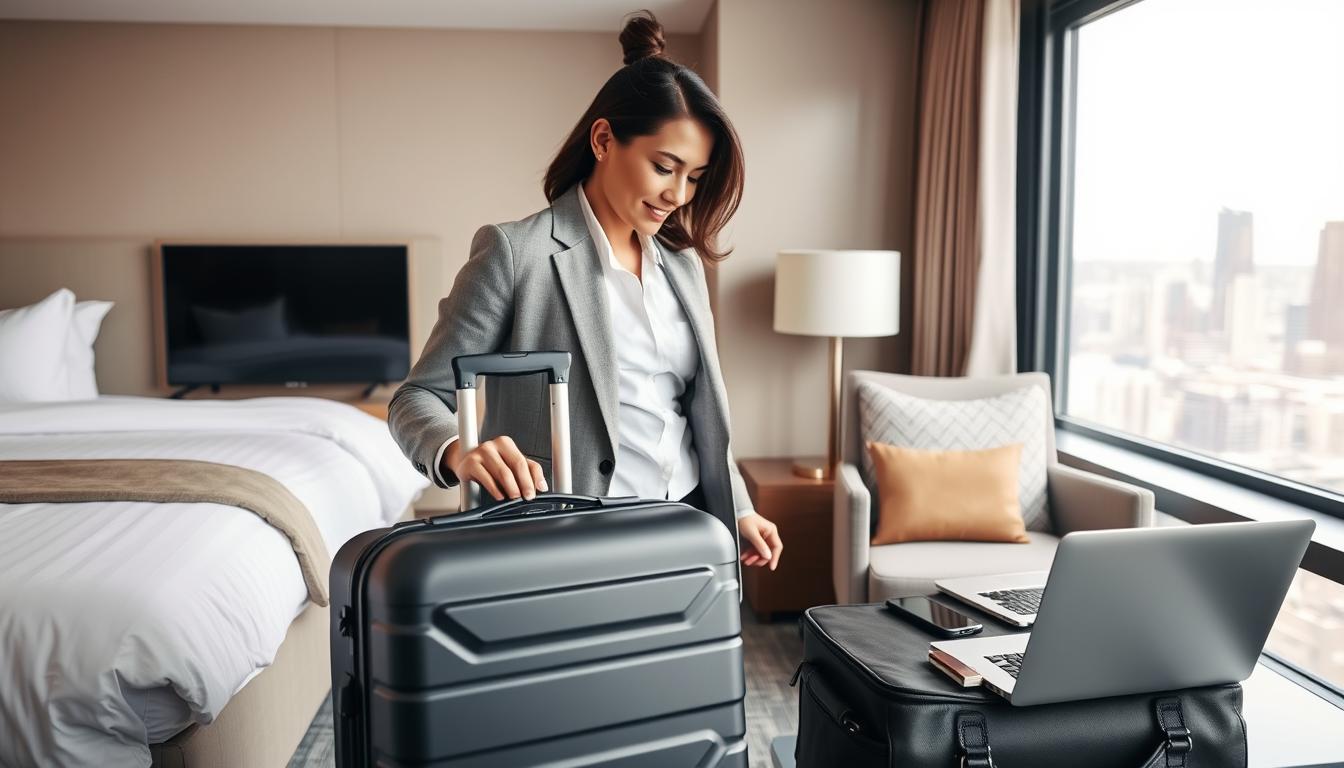Ever wonder how seasoned professionals manage to stay productive and energized during corporate travel? As work assignments increasingly involve jet-setting, mastering the art of efficient business trips has become crucial. From navigating airport lounges to optimizing your mobile office, this guide will equip you with strategies to excel in your travel for work endeavors.
The World Travel and Tourism Council reports that business travel made up 20% of global tourism spending in 2021, totaling over $740 billion. With such significant investment, it’s vital to make every work trip count. Whether you’re a frequent flyer or occasional road warrior, these tips will help you balance productivity and personal well-being during your corporate travels.
Key Takeaways
- Pack smart with a carry-on suitcase for efficiency and flexibility
- Utilize airport lounges and rewards programs for enhanced travel experiences
- Prioritize self-care routines, including exercise and healthy eating
- Leverage technology for seamless productivity on the go
- Balance work responsibilities with opportunities for local exploration
- Implement time-saving strategies like online check-in and TSA PreCheck
- Stay hydrated and maintain healthy habits throughout your business trips
Planning and Preparation for Successful Business Travel
Effective planning is key to successful business trips. A well-thought-out travel policy helps manage travel expenses and ensures smooth operations. Let’s explore essential steps for preparing your next work journey.
Creating a detailed itinerary
A comprehensive itinerary is crucial for staying on track during your trip. Include all meetings, events, and tasks to maximize productivity. Consider using travel management apps to streamline this process and keep your schedule accessible.
- Book flights and accommodations early
- Schedule meetings and transportation
- Allow buffer time for unexpected delays
Packing essentials for productivity
Smart packing is vital for maintaining efficiency on the go. Focus on items that support your work and comply with your company’s travel policy.
| Essential Items | Purpose |
|---|---|
| Laptop and charger | Work on-the-go |
| Portable power bank | Keep devices charged |
| Noise-canceling headphones | Enhance focus in noisy environments |
| Business attire | Maintain professional appearance |
Syncing travel plans across devices
Ensure seamless access to your itinerary by syncing your travel plans across all devices. This practice aligns with effective travel management and helps you stay organized.
Remember to review your company’s travel policy before finalizing arrangements. This helps control travel expenses and ensures compliance with corporate guidelines.
“Preparation is the key to success in business travel. A well-planned trip leads to better outcomes and reduced stress.”
Choosing the Right Accommodation for Business Trips
Selecting the perfect lodging for your business journey can significantly impact your Travel Arrangements and overall trip success. With accommodation costs making up 30-80% of travel expenses, it’s crucial to choose wisely.
Selecting hotels with business-friendly amenities
Hotels remain the top choice for business travelers, offering a range of options from budget to luxury. Look for amenities that boost productivity, such as high-speed Wi-Fi, business centers, and on-site meeting rooms. Many hotels now cater specifically to corporate guests, providing services tailored to their needs.
Exploring alternative lodging options
For extended stays or Employee Relocation, consider alternatives to traditional hotels. Serviced apartments combine hotel-like services with the comfort of a fully equipped home. Corporate housing offers furnished apartments or houses for temporary rent, ideal for longer business trips.

Prioritizing location for convenience
Location is key when choosing business accommodations. Opt for lodgings near your meeting venues or in central business districts to minimize commute times. This approach not only saves time but also reduces transportation costs.
| Accommodation Type | Best For | Key Features |
|---|---|---|
| Hotels | Short stays | Business centers, Wi-Fi, on-site dining |
| Serviced Apartments | Extended stays | Full kitchen, housekeeping, hotel-like services |
| Corporate Housing | Relocations | Fully furnished, home-like atmosphere |
| Extended Stay Hotels | Week-long trips | Kitchenettes, laundry facilities |
Remember, over 60% of business trips now include a leisure component. Consider this trend when choosing the right accommodation for business, balancing work needs with potential downtime activities.
Maintaining Productivity While on the Move
Balancing Work Assignments with Travel Management can be challenging. A study reveals that 37% of professionals struggle to maintain productivity while experiencing new destinations. This statistic highlights the importance of developing effective strategies for staying on top of your work during business trips.
Creating a structured routine is key to productivity. Setting specific work hours, meal times, and rest periods can boost efficiency by 27%. This approach helps combat jet lag, which affects 41% of business travelers’ productivity. Prioritizing tasks based on difficulty or mental effort is a strategy employed by 23% of individuals to maximize their output.

Effective Travel Management involves pre-planning. About 65% of travelers plan their schedules ahead of time to optimize productivity. This includes creating a mobile office setup with essential devices and tools. Investing in travel-friendly electronics correlates with a 22% improvement in work efficiency.
| Productivity Strategy | Impact |
|---|---|
| Maintaining healthy eating habits | 66% more productive |
| Utilizing flight time for work | 30% of time spent on tasks |
| Using packing lists | 32% of bloggers find it helpful |
| Adopting healthier lifestyle choices | 14% increase in productivity |
By implementing these strategies, you can effectively manage your Work Assignments while traveling. Remember, productivity and travel experiences can coexist with proper planning and discipline.
Travel For Work: Time Management Strategies
Mastering time management is crucial for successful corporate travel. A Developmental Academy study reveals that 4 in 5 people struggle with effective time management. This challenge becomes even more pronounced when traveling for work. Let’s explore strategies to maximize productivity during business trips.
Utilizing travel time effectively
Make the most of your travel time by tackling important tasks. Use flight hours to catch up on emails, prepare for meetings, or complete offline work. For instance, when planning work trips, allocate 1.5-2 hours for airport procedures before takeoff.
Implementing time-blocking techniques
Time-blocking is a powerful method for managing tasks efficiently. Break your day into chunks, assigning specific activities to each block. This approach helps limit distractions and improves focus during corporate travel. Consider using the Eisenhower technique to prioritize tasks:
- Do First: Urgent and important tasks
- Schedule: Important but not urgent tasks
- Delegate: Urgent but not important tasks
- Don’t Do: Neither urgent nor important tasks
Balancing work and personal time
Maintaining a healthy work-life balance is essential, even when traveling for work. Schedule self-improvement time to boost motivation and generate fresh business ideas. Don’t forget to plan for personal activities, such as exploring your destination or relaxing. This balance helps prevent burnout and enhances overall productivity during your business trip.
“Time management allows control over how time is spent, enabling more travel-related work to be completed.”
By implementing these time management strategies, you’ll navigate corporate travel more efficiently, reducing stress and maximizing your productivity on the road.
Leveraging Technology for Seamless Business Travel
In today’s fast-paced business world, technology plays a crucial role in streamlining travel management and arrangements. With the global business travel market expected to grow by 188% by 2028, leveraging the right tools can make a significant difference in productivity and efficiency.
Essential Apps for Business Travelers
Over 80% of business travelers use comprehensive travel apps to manage their itineraries, book accommodations, and track expenses. These apps streamline travel plans and potentially reduce costs. Popular choices include TripIt and Concur, which offer all-in-one solutions for travel management.
Cloud-based Solutions for File Access and Collaboration
Cloud-based platforms are essential for seamless file access and collaboration across devices. Services like OfficeSuite or MobiDrive allow travelers to work on documents, spreadsheets, and presentations from anywhere. This accessibility ensures that business doesn’t stop just because you’re on the move.
Creating a Mobile Office Setup
A well-equipped mobile office is vital for maintaining productivity during travel. Consider investing in:
- Portable chargers and universal adapters
- Noise-canceling headphones for focused work in noisy environments
- Portable Wi-Fi devices for uninterrupted internet access
- Smart luggage with GPS tracking and built-in scales
By embracing these technological solutions, business travelers can turn every trip into a strategic investment towards future success. Remember, effective travel arrangements and management are key to staying competitive in the global market.
Networking and Relationship Building on Business Trips
Business trips offer prime opportunities for networking and relationship building. With 85% of jobs filled through networking, making connections during corporate travel is crucial. Events play a key role, as 78% of professionals view them as vital for career growth.
LinkedIn, boasting over 700 million users, is a powerful tool for connecting with industry peers. Before your trip, use it to identify potential contacts in your destination city. This preparation can lead to productive face-to-face meetings, which are often more impactful than virtual interactions.
Meals are excellent for networking, with 93% of professionals agreeing that sharing food builds stronger connections. Schedule dinners or lunches with clients or colleagues to foster deeper relationships. Remember, you have just seven seconds to make a first impression, so arrive prepared and punctual.
- Set measurable goals for each business trip
- Use a specialized CRM to track contacts and interactions
- Take detailed notes for effective follow-up
- Move quickly on opportunities encountered during your trip
To maximize networking success, develop your social skills. Research suggests that up to 85% of career success stems from well-honed social abilities. Practice your elevator pitch, as 70% of professionals believe it significantly impacts networking outcomes.
After your business trip, follow up promptly. Studies show that 60% of new business opportunities arise from post-event follow-ups. By leveraging these strategies, you can turn your corporate travel into a powerful tool for professional growth and business expansion.
Conclusion
Business travel tips can significantly enhance your work trips, making them more productive and enjoyable. By implementing effective strategies, you can maximize your time and resources while traveling for work. From planning and preparation to leveraging technology, each aspect plays a crucial role in successful business travel.
The impact of remote work on travel patterns is noteworthy. A 1% decrease in onsite workers leads to a 1% reduction in vehicle miles driven but a 2.3% decrease in mass transit use. This shift affects different regions uniquely, with a 10% decrease in onsite workers potentially reducing annual CO2 emissions by 191.8 million metric tons nationwide.
For business travelers, who make up about 20% of all global travelers and take an average of 6 work trips annually, effective planning is key. Studies show that smart travel planning can cut expenses by up to 15%. Moreover, 80% of business travelers view networking during trips as crucial for career growth, while 75% combine business with leisure activities.
As the business travel landscape evolves, with Europe dominating the market and Asia poised for significant growth, adapting to new trends is essential. Whether it’s participating in MICE events or embracing environmentally friendly practices, staying informed and flexible will help you make the most of your travel for work experiences.
